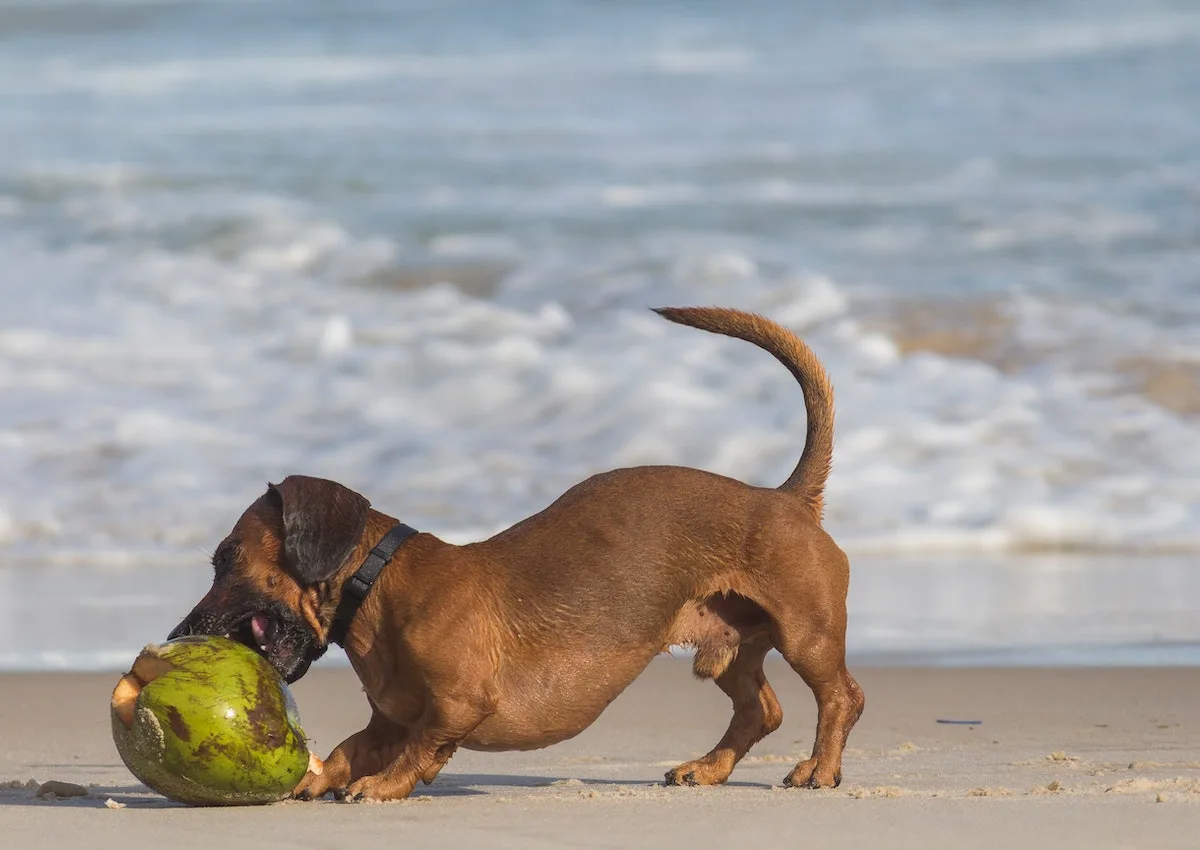Should dogs eat coconut? Is it safe? Coconut is a delicious and healthy ingredient in humans diets but is it ok to feed coconut to your dog? We’ll cover the ins and outs of this ingredient so you can make the best choice for your pet.

We all know coconut oil is good for dogs but what about the actual meat of the coconut? Should we be giving this to our dogs or is it something to avoid altogether?
In short, dogs can eat coconut. The meat of the fruit is just as healthy and safe as coconut oil. There is nothing inherently toxic or worrisome in coconut for dogs.
As with most foods outside of a dog’s typical diet, however, there are some considerations to be aware of and moderation should always be practiced.
Benefits of coconut for dogs
People love coconut for its taste and health benefits. Dogs are no different with most of them also enjoying the decadent taste of coconut meat. Beyond taste, coconut also includes an array of nutritious characteristics:
- high in manganese – beneficial to both bone health and metabolism
- primarily made up of lauric acid – a medium-chain fatty acid (MCT) that helps reduce inflammation and support the immune system
- high in antioxidants called phenolic compounds that help protect cells from oxidative damage
- low in carbs, high in fiber and fat which may help blood sugar regulation
Lauric acid is specifically great at fighting off viruses. For a dog’s health, this can be useful against common malaises such as Giardia, ringworm and influenza.

Skin benefits
People commonly use coconut oil on their skin to increase moisture. Both coconut oil and meat can be used on a dog’s skin internally and externally to help promote a healthy coat and skin. The anti-inflammatory properties of coconut can be helpful in dealing with excessive yeast on a dog.
What types of coconut products can a dog eat?
Coconut comes in a variety of products. All variations are safe for a dog to eat.
- Coconut meat – can be given either raw or dried in any form. Typically coconut meat is sold in flakes or shredded for use in baking. This makes it easy to add into homemade dog treats.
- Coconut oil – can be used topically or included in homemade dog food preparation. Use coconut oil in place of applesauce or pumpkin for dog treats. Coconut oil should be considered a supplemental fat however since it doesn’t include healthy omega-3 fats like sardines do.
- Coconut milk – as long as the coconut milk is unsweetened without added ingredients, this can be a safe way to incorporate coconut into your dog’s diet.
- Coconut flour – this grain-free flour is another great way to include coconut for your dog. It’s wheat-free and can be used in any dog treat recipe.
- Coconut sugar – while safe, added sugar is not necessary for dogs and really should be avoided. Try natural sweeteners like bananas or dates when baking for your pup instead.
What types of coconut products dogs should avoid
The outer shell and husk of a coconut should be avoided. The rough, hairy outer surface can be harmful to dogs if swallowed.
Sweetened coconut is common in human baking. Its best to avoid all sweetened products when it comes to feeding your dog, coconut included. Added sugar is never necessary in a dogs diet and if sweetened with artificial chemicals, can actually be fatal.
Coconut water should also be avoided. This natural water found inside of a coconut is very high in potassium and can cause a mineral imbalance for your pup. While hydrating for humans, it’s best to avoid for dogs. Stick to plain water for them.

How to incorporate coconut into your dog’s diet
There are myriad ways to include coconut in your dog’s diet if this is something you want to explore but we’ve got a few fun ideas to get you started:
- Make a coconut pupsicle – Use coconut milk and/or oil mixed with a dog safe fruit like bananas or strawberries and freeze into molds. These are great for the hot summer months.
- Bake coconut biscuits – Make a simple homemade biscuit recipe using coconut flour, egg, peanut butter and coconut oil.
- Mix in coconut flakes with their food – The easiest of all approaches is to simply mix in some unsweetened coconut with their normal food. Remember to limit “extras” like this to less than 10% of your dog’s diet.
The final word on coconut for dogs
Now that you know the answer to “can dogs eat coconut?”, feel free to experiment with including this in your canine companion’s diet if they like it. If you enjoy making homemade treats for your pup, coconut is a great ingredient to incorporate and gives you the ability to use oil, milk, flour or the meat itself.

